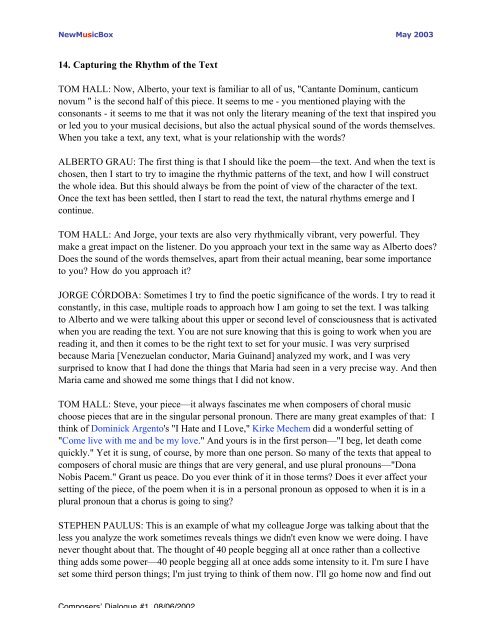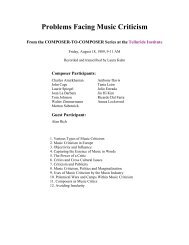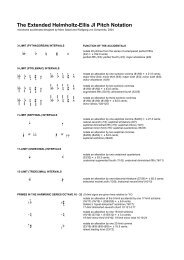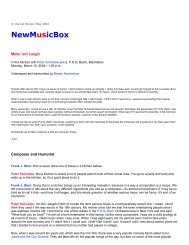Sixth World Symposium on Choral Music ... - NewMusicBox
Sixth World Symposium on Choral Music ... - NewMusicBox
Sixth World Symposium on Choral Music ... - NewMusicBox
You also want an ePaper? Increase the reach of your titles
YUMPU automatically turns print PDFs into web optimized ePapers that Google loves.
New<strong>Music</strong>Box May 2003<br />
14. Capturing the Rhythm of the Text<br />
TOM HALL: Now, Alberto, your text is familiar to all of us, "Cantante Dominum, canticum<br />
novum " is the sec<strong>on</strong>d half of this piece. It seems to me - you menti<strong>on</strong>ed playing with the<br />
c<strong>on</strong>s<strong>on</strong>ants - it seems to me that it was not <strong>on</strong>ly the literary meaning of the text that inspired you<br />
or led you to your musical decisi<strong>on</strong>s, but also the actual physical sound of the words themselves.<br />
When you take a text, any text, what is your relati<strong>on</strong>ship with the words?<br />
ALBERTO GRAU: The first thing is that I should like the poem—the text. And when the text is<br />
chosen, then I start to try to imagine the rhythmic patterns of the text, and how I will c<strong>on</strong>struct<br />
the whole idea. But this should always be from the point of view of the character of the text.<br />
Once the text has been settled, then I start to read the text, the natural rhythms emerge and I<br />
c<strong>on</strong>tinue.<br />
TOM HALL: And Jorge, your texts are also very rhythmically vibrant, very powerful. They<br />
make a great impact <strong>on</strong> the listener. Do you approach your text in the same way as Alberto does?<br />
Does the sound of the words themselves, apart from their actual meaning, bear some importance<br />
to you? How do you approach it?<br />
JORGE CÓRDOBA: Sometimes I try to find the poetic significance of the words. I try to read it<br />
c<strong>on</strong>stantly, in this case, multiple roads to approach how I am going to set the text. I was talking<br />
to Alberto and we were talking about this upper or sec<strong>on</strong>d level of c<strong>on</strong>sciousness that is activated<br />
when you are reading the text. You are not sure knowing that this is going to work when you are<br />
reading it, and then it comes to be the right text to set for your music. I was very surprised<br />
because Maria [Venezuelan c<strong>on</strong>ductor, Maria Guinand] analyzed my work, and I was very<br />
surprised to know that I had d<strong>on</strong>e the things that Maria had seen in a very precise way. And then<br />
Maria came and showed me some things that I did not know.<br />
TOM HALL: Steve, your piece—it always fascinates me when composers of choral music<br />
choose pieces that are in the singular pers<strong>on</strong>al pr<strong>on</strong>oun. There are many great examples of that: I<br />
think of Dominick Argento's "I Hate and I Love," Kirke Mechem did a w<strong>on</strong>derful setting of<br />
"Come live with me and be my love." And yours is in the first pers<strong>on</strong>—"I beg, let death come<br />
quickly." Yet it is sung, of course, by more than <strong>on</strong>e pers<strong>on</strong>. So many of the texts that appeal to<br />
composers of choral music are things that are very general, and use plural pr<strong>on</strong>ouns—"D<strong>on</strong>a<br />
Nobis Pacem." Grant us peace. Do you ever think of it in those terms? Does it ever affect your<br />
setting of the piece, of the poem when it is in a pers<strong>on</strong>al pr<strong>on</strong>oun as opposed to when it is in a<br />
plural pr<strong>on</strong>oun that a chorus is going to sing?<br />
STEPHEN PAULUS: This is an example of what my colleague Jorge was talking about that the<br />
less you analyze the work sometimes reveals things we didn't even know we were doing. I have<br />
never thought about that. The thought of 40 people begging all at <strong>on</strong>ce rather than a collective<br />
thing adds some power—40 people begging all at <strong>on</strong>ce adds some intensity to it. I'm sure I have<br />
set some third pers<strong>on</strong> things; I'm just trying to think of them now. I'll go home now and find out<br />
Composers’ Dialogue #1, 08/06/2002





